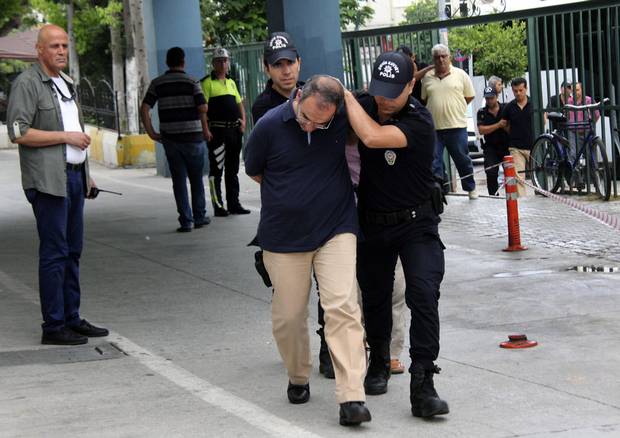A supporter of Turkish President Recep Tayyip Erdogan waves a flag against an electronic billboard during a rally in Kizilay Square on July 18 in Ankara, Turkey. Continuing raids across the country have seen thousands detained, suspended or arrested, including high ranking soldiers, judges and police officers.
Chris McGrath/Getty Images
President Recep Tayyip Erdogan continued to purge the ranks of Turkey's security forces and civil service on Tuesday as his government sought to oust anyone suspected of ties to the exiled cleric it blames for an attempted coup d'état in the country.
Almost 50,000 people have been removed from positions in the military, police and other government departments since the failed putsch, which was launched Friday but quickly collapsed after Mr. Erdogan called his supporters into the streets. At least 264 people died in fierce clashes that carried into Saturday, though other estimates put the figure dozens higher.
Ankara has accused Fethullah Gulen, a retired imam who lives in Pennsylvania, of masterminding the overthrow attempt. In the aftermath, Mr. Erdogan vowed to eradicate what he called the "virus" of Mr. Gulen's support network inside Turkey's government.
Mr. Erdogan, who broke down into tears at the funeral of one of his supporters, moved first against the army, where 6,000 allegedly pro-coup soldiers have been arrested and await charges. He has said he will consider public demands to reinstate the death penalty in the wake of the failed putsch.
MacKinnon: Unclear how far purges will go in creating ‘new Turkey’
2:06

Police officers escort admiral Atilla Demirhan, front, and a group of millitary personal detained in Mersin, Turkey, Tuesday, July 19, 2016.
Depo Photos via AP
Thousands of police, judges and prosecutors were also dismissed from their posts in the first hours after it was clear that Mr. Erdogan had survived the challenge to his power.
Announcements of the latest purges came via a series of rapid-fire bulletins on Tuesday.
First, it was the Prime Minister's Office, where the official Anadolu news agency said 257 people were fired and their identifications seized.
Next came an announcement that the country's media regulator said it would revoke the broadcast licences of "any radio or television outlet" deemed to have been supportive of the coup attempt. About 30 outlets were expected to be affected.
Then came the country's education system. More than 15,000 Education Ministry officials were dismissed on Tuesday, and the licences of about 21,000 teachers were revoked. The government also demanded that 1,577 university rectors and deans hand in their resignations, an order that was believed to cover every institute of higher education – state and private – in the country.

Men look at damage caused by fighting during a coup attempt at Turkish police special forces base near Ankara, Turkey, July 19, 2016.
Baz Ratner/REUTERS
Hundreds of employees were dismissed from other government departments, including the Directorate of Religious Affairs, where a large number of preachers and religious instructors were fired.
The United States and the European Union have expressed concern for the rule of law in Turkey as the purge accelerates, as have Amnesty International and Human Rights Watch.
But the Turkish government, which has demanded the extradition of Mr. Gulen while insinuating that the United States may have backed the coup, remains unapologetic.
"This parallel terrorist organization will no longer be an effective pawn for any country," Prime Minister Binali Yildirim said, referring to Mr. Gulen's network. "We will dig them up by their roots so that no clandestine terrorist organization will have the nerve to betray our blessed people again."
Turkey says it is preparing a formal request to have Mr. Gulen extradited to face trial. U.S. Secretary of State John Kerry has said a U.S. court will need to be convinced by evidence of Mr. Gulen's involvement.
Sinan Ulgen, chairman of the Istanbul-based Centre for Economics and Foreign Policy Studies, said the pace and scope of the purges suggested that the ruling Justice and Development Party had a ready list of suspected Gulen supporters – a network he compared to the Catholic Opus Dei – even before the putsch attempt.
Mr. Ulgen said the coup plotters may have been driven to act by a sense that a purge was coming anyway. "There was perhaps the last real opportunity for them to command their troops," he said. "Obviously the state, even before the coup, was getting ready for a large-scale purge. There was a list, and the coup may only have added a few more names to it."
Follow Mark MacKinnon on Twitter: @markmackinnon
Editor's note: An earlier version of this story gave an incorrect version of President Recep Tayyip Erdogan's name.